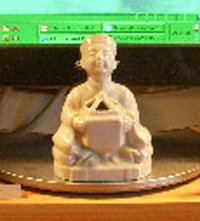Housekeeping Note:
Alternately
The first new book of the new year: As Always, Julia: The Letters of Julia Child & Avis DeVoto, edited by Joan Reardon. There is nothing I like better than a book of correspondence, with letters exchanged between two people presented in date order; and there are few masters of English prose who rival Julia Child’s command of serious fun. Of even greater interest to me is the letters’ tracing of Child’s later-life self-invention, which, I gather from reviews, was not smooth. “Alternately self-assured and self-doubting,” writes Reardon, describing the Child of the letters; in the Book Review, Corby Kummer puts it more strongly: “alternately confident to the point of arrogance and insecure almost to the point of giving up.” That sounds familiar. I try not to be arrogant about what I’m doing here, and I never even whisper words about giving up, but I bounce back and forth between the outer suburbs of both extremes. Child was lucky to have the friendship of a woman who understood the world from a less angular point of view.
Right at the moment I’m not in the middle of a heatedly active correspondence; partly this is because all I want to talk about is my glorious grandson who is so supremely remarkable and unlike all other children ever born. (Yes, sometimes even Kathleen wishes that she had a hearing aid that she could turn off.) Partly it is because I’m engaged in writing what amounts to an open letter to everybody. (You’re reading it.) Mostly, though, it’s because I haven’t found the right partner for the kind of dance that intrigues me at the moment. (And that partner hasn’t found me.)
What I want even more than a correspondent at the moment is a rival, a competitor, somebody else who is doing what I’m doing — whatever that is. Indeed, it’s when I get to see somebody doing what I’m doing that I’ll know what it is that I’m doing. Gun to my head? I’m scouting the Internet for visions of a better world, one that’s more mindful, less wasteful, and wholly humane. I’m trying to figure out how to make the values and resources that we associate with “the elite” comprehensible and available to everyone. Sounds pretty quixotic — but in the absence of a sparring partner my mind can’t be bothered to work any harder at its job description.
The genesis of the Child-DeVoto correspondence is oblique and could not have been predicted. Child wrote a letter to Bernard DeVoto, a Harvard professor and a columnist at Harper’s, in response to his piece about dull kitchen knives. (She enclosed an inexpensive but sound French knife.) Her letter was answered, as was most of his mail (one gathers), by his wife and gal Friday, Avis. Avis was described by one of her husband’s students, Reardon tells us, as “very good looking and very sexy-seeming and the only faculty wife who might have said ‘horseshit’ to President Lowell.” She liked to cook, too. Best of all, she had entrée to the world of publishing. But none of these datapoints explains why she and Child (a) hit it off and (b) exchanged hundreds of letters. You might as well explain it in terms of feng shui.
Perhaps, if Will’s extraordinariness would only dwindle a bit this year, I might become more attentive to the rest of the world. Until then, I can only ask you to keep your eyes out.

